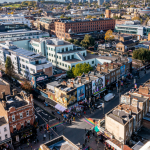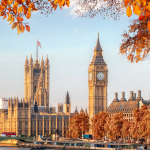When the Elizabeth line is mentioned, it’s impossible to stop Andy Lord – Transport for London’s (TfL) Commissioner – positively gushing with praise and pride at the project. “We call it the jewel in our crown. It’s been quite phenomenal. I’m incredibly proud of what we’ve delivered”, said Lord. And you can see why – in just over a year, it has seen 225 million journeys, and carries around 600,000 people a day. And the quality of the transport experience is attracting new passengers – Lord points out that “30% of journeys are new public transport journeys that people would otherwise not have been using public transport”.
Overnight, the Elizabeth line added 10% extra capacity to central London’s already enormous rail network. Andy Lord sits at the top of the organisation – which, with an income of £9billion a year, would put it close to the FTSE100 were it a private company. With a 27,000 strong workforce operating 9,300 buses, 272 Tube stations and 6,000 traffic lights, it’s no understatement to say that without an effective TfL, London would struggle to function.
In at the deep-end
Andy Lord became interim Commissioner in October 2022, before his permanent appointment in June this year. Lord first joined TfL in 2019, as Managing Director of London Underground, before progressing to Chief Operating Officer, having led the organisation’s response to Covid. Prior to TfL, Lord’s career hadn’t been in public transport, but in aviation. He started at British Airways as an under-graduate engineer, before working his way up over a 26-year career to Director of Operations.
Lord is in charge of what is widely seen as one of the world’s best public transport authorities. But its mettle was tested to the limit by the pandemic. Income all but dried up. Covid led to structural changes in the way we live, work and travel. Reflecting on the pandemic, Lord says “I’m incredibly proud of what we did as an organisation”.
Balancing the books
Despite all that has been thrown at the organisation, TfL will cover its costs from fare income for the first time next year – something the Commissioner describes as a “remarkable achievement” while at the same time still delivering key projects like the Northern line Extension to Battersea Power Station, London Overground to Barking Riverside and, of course, the Elizabeth line.
While passenger numbers have recovered well since Covid – particularly at weekends and on Tuesdays, Wednesdays and Thursdays – the beginning and end of the working week is still quieter. TfL closely monitor similar sized cities around the world for how they’re recovering from the pandemic. Lord points out that TfL “has had a bigger bounce back than any other public transport network in the UK” and, compared to Paris, he says what while the French capital “bounced back initially quicker… they plateaued sooner whereas ours has been more of a gradual increase.”
Adjusting to the new routine
Lord is clear that TfL “has to give people a reason to come in to the city. If we can collectively do that then we can get ridership back up to pre Covid levels”. Pushed on whether something more specific needs to be done about Mondays and Fridays – perhaps with ticketing and fares, he’s cautious in his answer, but rules nothing out. “We’ll always keep our fares structure under review”, he replies, pointing out that fares are in the gift of the Mayor, and “we’ll always consider all the options and make sure we give him a range from which he can make a choice.”
Things might not be back to pre-Covid levels but it could have been a lot worse. The Commissioner describes how TfL “pushed hard against some stakeholders in Government who wanted us to cut services to save money” and that “maintaining our services was absolutely fundamental to be honest”. He is categorical that “if we’d done what some in Government would have wanted us to do, we would be in a really difficult place now financially and with ridership”.
Build, and they will come
London Property Alliance’s new research demonstrates the transformative impact of the Elizabeth line on central London – 200,000 new office jobs created; 171 hotels opened and 2,666 new food and beverage outlets; 51% of central London office take up in 2023 within a 10-minute walk of Elizabeth line stations. The Commissioner is keen to big this up: “it shows what can be done. It shows that investment in really big infrastructure can change lives for the better by creating new journeys or creating new investment opportunities, whether that be in hospitality or homes, and it creates huge economic benefit”.
How can we use the Elizabeth line story to help make the case for future investment in transport infrastructure? Lord is clear – “We have a real life example of the economic benefits being delivered today to justify investment” he says. With no shortage of projects London would like to build, the Commissioner isn’t shy to trumpet TfL’s ambition “to spend over £6billion over the course of our business plan”. This includes new trains and signalling on the Piccadilly line and new trains on the DLR.
Extending the Bakerloo line from Elephant and Castle down the Old Kent Road through an area of vast development opportunity is on Lord’s wish list, but it lacks the Government funding needed. Pushed on what the consequences would be if the money doesn’t come forward, he highlights the risk of stopping the rolling programme of upgrades to the network. He doesn’t paint a pretty picture, with TfL having “to rely on trains – as in the case of the Bakerloo line – that came into service in 1972, the Piccadilly line in 1973”.
The Bakerloo line already has the oldest trains in service anywhere in Britain. His assessment of the consequences is bleak – “we’ll see service reliability drop off which will be bad for London and bad for the economy.”
Navigating through the political landscape
Politics is clearly shaping the Commissioner’s thinking when it comes to financial support from the Treasury. He’s clear that TfL would “like to get a three to five year capital funding settlement” but that “the reality is we’ll probably get two single years because of where we are in the electoral cycle and whoever is in power post a General Election is going to have to do a Spending Review”.
Few expect much long-term thinking this side of 2025 but Lord is still determined to make the case. “We’ve got to secure more capital funding from Government”, he goes on to say, “our ask for next year is £500m from Government but we’re planning to spend nearly £2billion on capital expenditure next year, 75% of which we’ll be able to fund ourselves … something TfL’s never been able to do before.”
One project he’s optimistic about is the DLR extension to Thamesmead. The stars seem to be aligning – “we do appear to have cross-party support to extend DLR out to Thamesmead – two new stations, an extension under the Thames, creating 30,000 new homes and 20,000 new jobs”. A business case from TfL is sat in a Whitehall in-tray awaiting a decision. This project, Lord argues, “enables a new area of town to be re-developed and a new workforce to be able to get into central London”.
Places for London
Asked about Places for London, the recently relaunched property arm of TfL, Lord launches into a passionate sell about the potential for the city. “Places for London”, he says “is a really smart play on what TfL does – it demonstrates what we want to do for the city both in terms of regeneration, in terms of delivering up to 20,000 new homes and investing in local communities”
And he’s right of course – for all that TfL runs buses, Tubes, trains, trams and looks after roads, traffic lights, and regulates taxis – it’s also an agent of regeneration, a driver of economic development and a custodian of some serious heritage assets. As well as owning track, train sheds and stations, it’s a landlord to many businesses and the second biggest landowner in the city.
Andy Lord isn’t afraid to be open and honest that TfL isn’t on home territory with Places for London. His message is clear – TfL needs the help of the property and developer world – “We are far from being property experts so we want to work with the people who are experts,. Work with us, so we can see what the art of the possible is”. But there’s one caveat from the Commissioner – they’ll work with “those who share our values and are in line with the Mayor’s strategy, because we want to use this to create new communities or add to existing communities”.
What comes next?
London’s next mega project was meant to be Crossrail 2 and it’s obvious that Lord, in his heart, would love to get shovels in the ground but in his head knows it’s looking tough. “Crossrail 2 we would absolutely love to do”, he says, “Unfortunately I think it is way off on the horizon“. However, he’s still keen to keep momentum behind the project, and this includes working with the Government to safeguard the route. Perhaps mindful of how long it took to build the Elizabeth line, he points out that “there is a risk with the route through central London, as developments continue to happen, that we will either add cost and risk to commercial developments or we risk jeopardising the route if we don’t safeguard”.
Magic ingredients
In the face of many challenges, it is in many respects a miracle that the Elizabeth line actually got built. When asked why, Lord points to “cross-party support” adding that “if the two main parties aren’t in agreement or central and local government are not in agreement, you’re always going to struggle to get the outcome you want”. But he’s also clear that the backing of the capital’s business community was key and, in particular, the funding that came direct from business. Lord argues that businesses’ financial contributions mattered because “once they have contributed it’s a lot harder for the politicians to row back”.
Given the ongoing uncertainty around HS2 and Crossrail 2, it remains to be seen whether the Elizabeth line will end up as a one off, or whether it is possible to recreate the same successful mix of ingredients and get the UK’s next mega transport projects off the drawing board.


